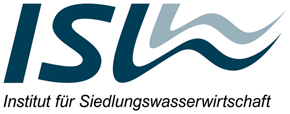
Stefanie Wolter
Investigations on Substrate Dependency of the Heterotrophic Yield Coefficient
Abstract
This thesis examines whether and to which magnitude excess sludge production fluctuates in dependency on the degraded carbon source. It was assumed that the empiric heterotrophic yield in wastewater treatment is the result of interfering parallel degradation processes of the numerous wastewater constituents and thus only appears to be uniform. To prove this assumption the chemically undefined multi-substrate wastewater was reduced to a single, chemically defined and soluble carbon source in a synthetic wastewater.
The focus of this study lies on balancing carbon degradation processes in uncovered, lab-scale (20 L) membrane bio reactors (MBR). Specific, heterotrophic yields in dependency on the supplied chemically defined, soluble mono-substrates were determined under constant test conditions (sludge age, sludge loading rate, temperature, pH-value) in the MBRs. At first the sludge was adapted to the substrate. Using a sludge age of five days, material flow and substrate degradation were measured by making up mass balances of liquid and solid fractions.
Degradation processes of 25 mono-substrates (six carbohydrates (mono- and disaccharides), seven alcohols, eleven carbonic acids and one ether) were investigated. The observed yields were calculated on the basis of mass balances of the parameters COD, TOC, TSS, VSS under constant test conditions. The observed yields showed that the heterotrophic yield is not a constant value but varies in dependency on the degraded substrate. The maximum observed fluctuation range of the tested substrates varied between 340 % and 6,417 % depending on the selected reference parameter.
A classification criterion found for YH,COD, YH,VSS/COD and YH,VSS/C was that the degradation of hydrocarbons generally resulted in higher-than-average yields. For YH,VSS/COD, YH and YH,VSS/mol mathematical regressions could be found which correlated the observed yields with the F/M-ratio of the test system as well as with the COD/TOC-ratio, the calorific value, the molar mass and the standard reaction enthalpy of the degraded substrate.
After unitising the observed net-yields and the empirical gross-yields used by ATV-DVWK Arbeitsblatt 131 based on COD (0.67 g COD/g COD) or VSS/BOD5 (by HARTWIG 0.75g VSS/g O2) the results on average complied with the COD-based value of ATV-DVWK (deviation 1.5 %). When comparing the results with HARTWIG a deviation of +24 % showed. This deviation arises from the selected COD/BOD5-ratio used for conversion.
Soluble mono-substrates can be regarded as a first approach to examining substrate specific heterotrophic yields. Degradation processes and resulting yields of complex substrates, suspended, water-insoluble and particulate carbon sources should be focus of further investigations.
Vacancies of TU Braunschweig
Career Service' Job Exchange
Merchandising
Term Dates
Courses
Degree Programmes
Information for Freshman
TUCard
Technische Universität Braunschweig
Universitätsplatz 2
38106 Braunschweig
P. O. Box: 38092 Braunschweig
GERMANY
Phone: +49 (0) 531 391-0
